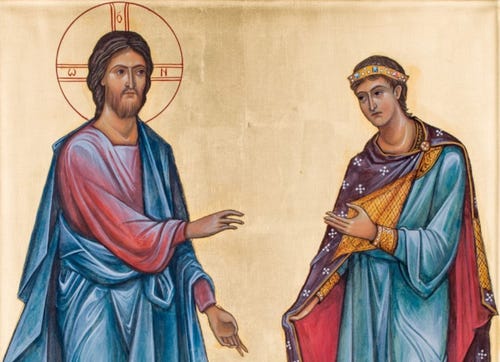The Eleventh Day of Christmas: Holy Poverty
I’m wondering about the vow of Poverty for the Third Order Franciscan.
Since starting this project of posting daily through the 12 Days of Christmas, I have picked up quite a few new subscribers. Welcome! I am glad you are here. And to the paid subscribers, thank you for helping make it possible for me to share everything I write with everyone who subscribes. Your generosity is greatly appreciated.
If you did not already know, I am a novice in the Third Order of The Society of St. Francis. It is an Anglican order similar to the Catholic “secular” Franciscans. Each month, we read through the Rule…a little bit each day. As today is the fourth day of the month, the following is the assigned reading. I have thoughts.
Today’s Franciscan Nugget: “Day Four - The Object, cont'd - When Saint Francis encouraged the formation of the Third Order he recognized that many are called to serve God in the spirit of Poverty, Chastity, and Obedience in everyday life (rather than in a literal acceptance of these principles as in the vows of the Brothers and Sisters of the First and Second Orders). The Rule of the Third Order is intended to enable the duties and conditions of daily living to be carried out in this spirit.”
What does this look like? I’m trying not to aggrandize the American middle class here. There’s nothing inherently virtuous about being middle class. St. Francis would have balked at that claim as well. And yet, here I am a novice in the Third Order. I am middle class. I work as a hospice chaplain and my wife is a substitute teacher when she is not on stage.
Am I just trying to sacralize my present lifestyle or am I attempting to transform it?
I would like to think I am embarking on a formation process to transform my life while also sacralizing it at the same time. It’s not enough to live in the “spirit of Poverty,” for example. One must have a relationship to one’s resources that reflects the Poverty of Christ, who had no place to lay his head (Luke 9:57-59). Accruing wealth is not a virtue. Giving it away, however, is. Letting it go is. Not defining oneself by one’s possessions is.
I am not my wealth. My wealth is a privilege that must become a blessing for others in some fashion. Giving it away is a good start (Mt. 19:21).
How do you understand Holy Poverty? Does it influence your relationship with your wealth? How do you express your own faith in God where your wealth is concerned?





One of the reasons St. Francis objected to posessoions is because if he had anything, he would have to defend it. Posessions would distort his relationships with people. I am not sure that begging for food from someone doesn't didstort or at least influence one's relationship with people. I think any relationship at all impacts the relationship. That is whan relationhip is--changing and being changed by one another. The quality that is problematic is a defensive stance. That is becaue there is a power dynamic involved in a defense. I would argue, that if we usse Francis's logic, then we should not defend anyone with more power than us. We should only defend those with less power than we have. God, Jesus, the cross, institutions such as marriage need no defense. They can defend themselves. To use a capitalist image, they can compete in the marketplace, often by changing or adapting. If they can't then they aren't a very good deal, and the poor cannot afford them. Poverty involves relationships that are worth it, the relationship is affordable or free., it doesn't demand more than one can give,. One's own poverty puts you in a position to depend on others and to draw out the best in them. It puts others in a position to come to your aid and to defend you.
When I think about holy poverty, I think of it not (necessarily) as being about money but as an attitude about ownership. I own my house, but I regard it as a tool through which I can serve others. I get paid pretty well, and I generally regard the income as a tool God uses to bless the world around me. For me it’s about letting go of the “possession” aspect and trying to live as though I am a conduit of grace. Not sure if that’s what you’re getting at, though.